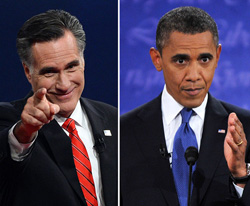CAUSE FOR DEBATE
By Darryl McPherson
 |
Like many observers of the presidential debate last week, I was somewhat surprised by President Barack Obama’s less-than-stellar performance. It’s not that he was expected to outshine his challenger, former Massachusetts Governor Mitt Romney; it’s that as an orator and public figure, Obama should have known better.
Mere weeks ago, at the Democratic National Convention, former President Bill Clinton was hailed as the Explainer-in-Chief for his deft ability to break down the differences between Obama’s and Romney’s policies. With that knowledge in his back pocket, Obama should have been more than ready to address Romney’s points. Instead, we got the Professor-in-Chief, who frequently looked down at his notes and allowed his opponent to seize the energy, seize the moment, and the momentum coming out of this first round of debates.
When it comes to these so-called debates, one must be cognizant of certain rules, whether written or unwritten. Depending on the format, the ability to explain anything is limited at best. You don’t have the luxury of visual aids, the full command of the stage and most importantly, time to get it right. That means, what you have to say is secondary to how you say it.
Last week’s debate was more about style and presentation than it was about domestic policy. Romney was firm, aggressive and in command. That speaks to being presidential. Meanwhile, the President himself was contemplative, loquacious and cool. Fine qualities for a president also, but they are poor representations in the age of the sound bite and limited attention spans. Plus, it just plays poorly on television.
Ask Richard Nixon about what that can mean, if you have any doubts.
Still, a poor or less-than-great performance in an initial debate is not the end-all or be-all of a presidential campaign. There is, of course, time to bounce back. But the irrevocable lesson from this is the revelatory chink in the armor; a president who has almost always dazzled and amazed from the public stage has been shown to be, in this instance, second-best.
I learned in high school (not law school as one would think) the key to winning a debate. No matter what, never concede the validity of your opponent’s point. Whether you’re talking about abortion rights, the color of the sky or which cola is best, you take your position and hold on with all of your might.
The time to agree is at the negotiation table. At a debate, or anytime you want to create a contrast, the only thing that matters is how strongly you defend your position. You have to be brief, you have to be sure and you have to be strong. Or, at least it has to come across that way. Then your audience will more likely walk away with the same impression.
I offer this advice freely, without regard to political persuasion, though the party that needs it the most should take heed the next time around.